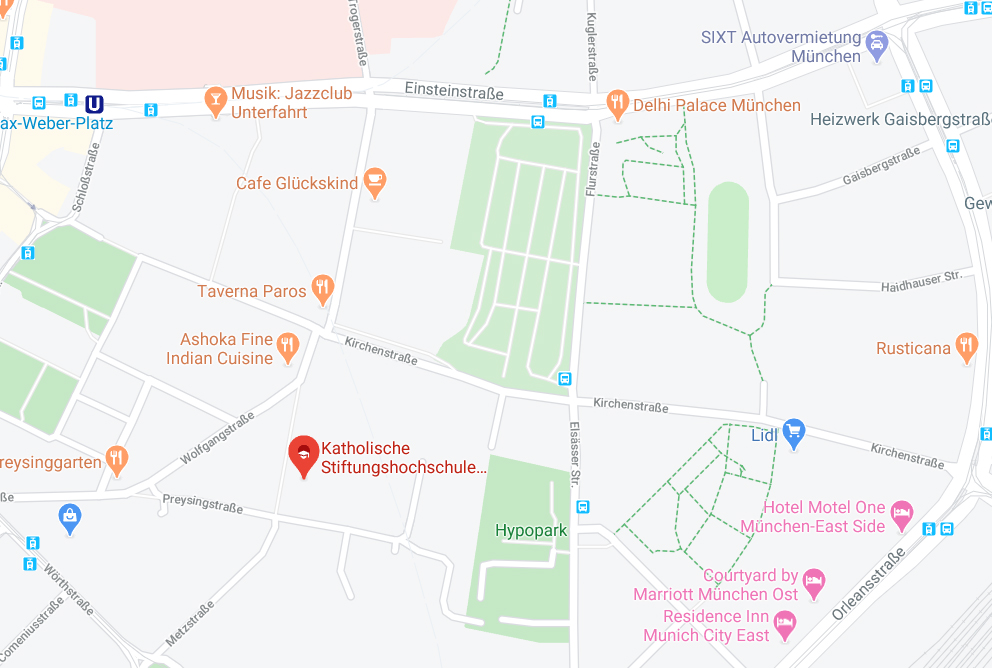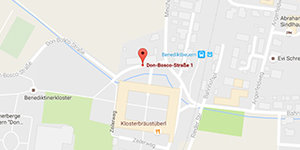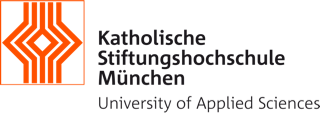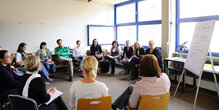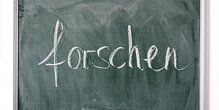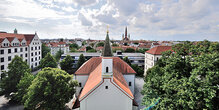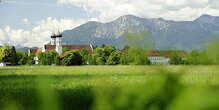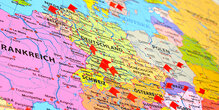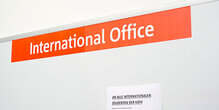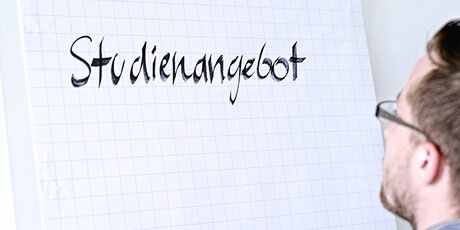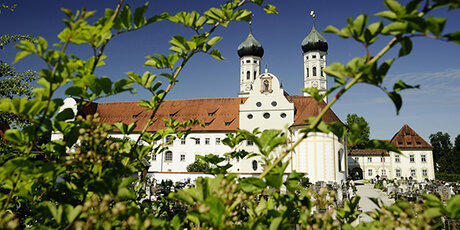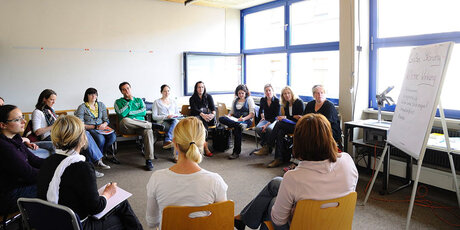Music Pedagogy additional qualification (MUZA)
Study location
Benediktbeuern campus
Faculty
Social Work, Benediktbeuern
Application period
online 01.05. - 20.08.
Standard period of study
6 semesters in addition to studies
Academic qualification
university certificate, Music Pedagogy additional qualification (MUZA)
Costs
own contribution of €90 per semester
What is the Music Pedagogy additional qualification (MUZA)?
The Music Pedagogy additional qualification (MUZA) is a newly-developed qualification which can be completed during studies for students of the two Bachelor's degree programmes in Social Work and Religious Education and Church Educational Work at the KSH in Benediktbeuern. In this additional qualification - which to date is unique nationwide - students can improve their musical skills in courses based on experiential learning and practical musical projects, in order to later integrate them into religious education or social work activities.
A focus area in the Music Pedagogy additional qualification (MUZA) is working with music using digital media, which can be tested under professional guidance in the newly furnished and superbly equipped production and recording rooms of the Center for Music at the Benediktbeuern campus. In small ensembles, initial experience can be gained here in leading small music groups, under expert supervision.
Goals & abilities
As a medium of communication and expression, music enriches the professional activities in both social work and religious education. MUZA’s objective, therefore, is for students to utilise music’s diverse possibilities to accomplish tasks in their fields of action: in MUZA, students learn where and how musical activities can be integrated into their educational actions in a targeted and responsible manner, and how the relationship-building and community-boosting properties of music can be utilised for intercultural and interdenominational education, for integration, inclusion and participation.
Musical and educational skills which are aligned with professional action in religious education and social work are acquired during the practice-oriented Music Pedagogy (MUZA) additional qualification:
- Identify effects of music and reflect target-group oriented on them
- Structure musical relationships according to needs and situation
- Develop educational offers for informal musical learning
- Use music as an educational medium in a targeted and responsible manner
Contents of the additional qualification
The Music Pedagogy additional qualification (MUZA) extends over six semesters during studies, and consists of courses on offer in a total of six different modules, some of which are integrated into the Bachelor's degree programmes in Social Work and Religious Education and Church Educational Work.
- The courses in the module MUZ 1 deal with the importance and impact of music - for example, the spiritual dimensions of music, different cultural meanings of music, or the benefits of music for health and the community.
- In the module MUZ 2, methods of music education are conveyed in the form of concepts and didactic approaches for the pedagogical use of music.
- In the module MUZ 3, the acquired skills are tested in cooperation with professional partners in the region, in the framework of a practical project through project work in the field.
- In the module MUZ 4, musical and music educational actions with people of all ages are conveyed in the fields of religious education and social work.
- In the module MUZ 5, possibilities of musical actions with digital media - including audiovisual media in the form of music videos - are tried and tested under professional guidance.
- In the module MUZ 6, small ensembles are formed, where students gain experience in musical communication and learn to the lead a musical group under expert supervision. At the end, they develop and present their own artistic music performances.
- On top of this, additional music pedagogy events are offered for all students at the Center of Music on the subjects of: community music, drum circles and prevention of violence through music.
Opportunities & perspectives
Music is perceived as an integral part of education in many practical fields of religious education, church educational work and social work. In all cultures, music is part of life, and thus opens up a variety of professional opportunities to use its communication potential.
A qualification in music pedagogy broadens the pedagogical repertoire of methods:
- in child daycare centers, crèches and after-school care
- in schools as part of lessons in religious eduaction, as well as in school social work
- in youth centers and youth work in the church
- in children's homes and in educational culture activities
- in retirement homes and social meeting places
- in work-related offers for people with disabilities
- in offers for refugees
As an educational medium, music can be specifically integrated into the fields of action of religious education and social work, and thus open up new perspectives
- for interdenominational education for people with a migrant background - for example in the form of an intercultural church band
- for the integration and inclusion of people with disabilities, and the participation in musical-cultural offers for people of all ages - for example in the form of an inclusive choir with several generations
- for the prevention of addiction and violence in children and young people - for example in the form of a school project with rhythm and percussion
- for stress prevention and health promotion - for example in the form of an offer to relax with music for mentally ill young people
Contacts
Management MUZA
Prof. Dr. Christine Plahl
Leitung Zentrum Musik und MUZA
Telefon: +49 8857 88-529
christine.plahl@ksh-m.de
Instructor at the Center of Music
Fabian Gierscher
Referent im Zentrum Musik
Telefon: +49 8857 88-512
fabian.gierscher@ksh-m.de
Music Pedagogy additional qualification (MUZA)
Study location
Benediktbeuern campus
Faculty
Social Work, Benediktbeuern
Application period
online 01.05. - 20.08.
Standard period of study
6 semesters in addition to studies
Academic qualification
university certificate, Music Pedagogy additional qualification (MUZA)
Costs
own contribution of €90 per semester
What is the Music Pedagogy additional qualification (MUZA)?
The Music Pedagogy additional qualification (MUZA) is a newly-developed qualification which can be completed during studies for students of the two Bachelor's degree programmes in Social Work and Religious Education and Church Educational Work at the KSH in Benediktbeuern. In this additional qualification - which to date is unique nationwide - students can improve their musical skills in courses based on experiential learning and practical musical projects, in order to later integrate them into religious education or social work activities.
A focus area in the Music Pedagogy additional qualification (MUZA) is working with music using digital media, which can be tested under professional guidance in the newly furnished and superbly equipped production and recording rooms of the Center for Music at the Benediktbeuern campus. In small ensembles, initial experience can be gained here in leading small music groups, under expert supervision.
Goals & abilities
As a medium of communication and expression, music enriches the professional activities in both social work and religious education. MUZA’s objective, therefore, is for students to utilise music’s diverse possibilities to accomplish tasks in their fields of action: in MUZA, students learn where and how musical activities can be integrated into their educational actions in a targeted and responsible manner, and how the relationship-building and community-boosting properties of music can be utilised for intercultural and interdenominational education, for integration, inclusion and participation.
Musical and educational skills which are aligned with professional action in religious education and social work are acquired during the practice-oriented Music Pedagogy (MUZA) additional qualification:
- Identify effects of music and reflect target-group oriented on them
- Structure musical relationships according to needs and situation
- Develop educational offers for informal musical learning
- Use music as an educational medium in a targeted and responsible manner
Contents of the additional qualification
The Music Pedagogy additional qualification (MUZA) extends over six semesters during studies, and consists of courses on offer in a total of six different modules, some of which are integrated into the Bachelor's degree programmes in Social Work and Religious Education and Church Educational Work.
- The courses in the module MUZ 1 deal with the importance and impact of music - for example, the spiritual dimensions of music, different cultural meanings of music, or the benefits of music for health and the community.
- In the module MUZ 2, methods of music education are conveyed in the form of concepts and didactic approaches for the pedagogical use of music.
- In the module MUZ 3, the acquired skills are tested in cooperation with professional partners in the region, in the framework of a practical project through project work in the field.
- In the module MUZ 4, musical and music educational actions with people of all ages are conveyed in the fields of religious education and social work.
- In the module MUZ 5, possibilities of musical actions with digital media - including audiovisual media in the form of music videos - are tried and tested under professional guidance.
- In the module MUZ 6, small ensembles are formed, where students gain experience in musical communication and learn to the lead a musical group under expert supervision. At the end, they develop and present their own artistic music performances.
- On top of this, additional music pedagogy events are offered for all students at the Center of Music on the subjects of: community music, drum circles and prevention of violence through music.
Opportunities & perspectives
Music is perceived as an integral part of education in many practical fields of religious education, church educational work and social work. In all cultures, music is part of life, and thus opens up a variety of professional opportunities to use its communication potential.
A qualification in music pedagogy broadens the pedagogical repertoire of methods:
- in child daycare centers, crèches and after-school care
- in schools as part of lessons in religious eduaction, as well as in school social work
- in youth centers and youth work in the church
- in children's homes and in educational culture activities
- in retirement homes and social meeting places
- in work-related offers for people with disabilities
- in offers for refugees
As an educational medium, music can be specifically integrated into the fields of action of religious education and social work, and thus open up new perspectives
- for interdenominational education for people with a migrant background - for example in the form of an intercultural church band
- for the integration and inclusion of people with disabilities, and the participation in musical-cultural offers for people of all ages - for example in the form of an inclusive choir with several generations
- for the prevention of addiction and violence in children and young people - for example in the form of a school project with rhythm and percussion
- for stress prevention and health promotion - for example in the form of an offer to relax with music for mentally ill young people
Contacts
Management MUZA
Prof. Dr. Christine Plahl
Leitung Zentrum Musik und MUZA
Telefon: +49 8857 88-529
christine.plahl@ksh-m.de
Instructor at the Center of Music
Fabian Gierscher
Referent im Zentrum Musik
Telefon: +49 8857 88-512
fabian.gierscher@ksh-m.de
